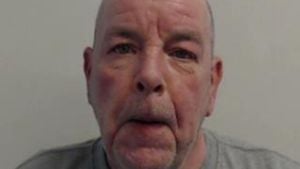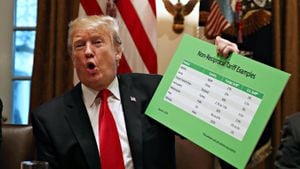Legal disputes often weave through the courtrooms, but when it involves high-profile figures, like former Taraba State Governor Darius Ishaku, the stakes are elevated. Recently, the Federal Capital Territory High Court found itself at the center of allegations involving N27 billion, with Ishaku and former permanent secretary Bello Yero facing serious charges including breach of trust and conspiracy.
Justice Sylvanus Oriji presided over the case, during which the defendants raised preliminary objections questioning the court's jurisdiction. Their legal team, comprising notable senior advocates, argued vigorously, claiming the issues at hand pertained exclusively to the finances of the Taraba State government. They pointed out fundamental concerns about whether the Economic and Financial Crimes Commission (EFCC) has the authority to prosecute cases involving state finances.
One of the key arguments made by Ishaku's lawyer, P.H. Ogbole, SAN, was the suggestion of the court lacking both constitutional and territorial jurisdiction to hear this case. He emphasized how the investigation and prosecution of state financial matters are within the purview of the state government. Further, he brought to light how the prosecution itself admitted, at least partly, the alleged offenses occurred outside its jurisdiction—in Abuja.
Yero's counsel, Adeola Adedipe, joined the fray, reinforcing the critique aimed at the EFCC's scope of action. He asserted there already exists an anti-corruption agency within Taraba State, and denoted how referencing the Shema v. FRN case established important precedents relevant to their situation. Following the legal logic, he derived the conclusion any financial misconduct investigation applicable to Taraba should fall under the jurisdiction of the state’s own anti-corruption agency.
Despite these compelling defenses, the prosecution urged the dismissal of the objections. Senior Advocate Rotimi Jacobs pointed out the EFCC’s authority to address cases involving state funds, highlighting the legal grounds for the court’s jurisdiction.
The controversy centers on not just the legal representation defending their clients but also on how jurisdictional challenges like these can stall proceedings. Often, such challenges set the stage for prolonged legal engagements, allowing for tactics not uncommon among defendants facing serious allegations.
After hearing arguments from both sides, Justice Oriji decided to reserve his ruling until the time of the judgment, as permitted by Section 396(3) of the Administration of Criminal Justice Act (ACJA). It suggests the judge is taking time to deliberate on the complex points of law raised without rushing to judgment. The next court date was set for January 21, keeping both the accused and the public on edge.
The legal tussle arises from serious allegations of financial malfeasance between August 2015 and May 2019, with specific instances noted during which significant portions of government contingency funds were allegedly diverted for personal gain. For example, the EFCC’s charges detail instances where over N1 billion was misused, with claims of misallocation of funds to settle loans from Zenith Bank.
On multiple occasions, the accused allegedly siphoned or mismanaged funds, such as the sum of N1,010,000,000 linked to the Bureau for Local Government and Chieftaincy Affairs. The details could paint a picture of systemic corruption if proven, but as of now, both defendants have pleaded not guilty, insisting on their innocence amid these serious allegations.
The case, as it stands, is not just about the men among the accusations, but also reflects larger issues around accountability and transparency within Nigerian politics and governance. With public scrutiny ramping up, it highlights the tension between state and federal legal powers and brings to light the necessity of clearly defined jurisdictional boundaries.
Therefore, as the court prepares to revisit the issues come January, the anticipated deliberations may not just unravel the motives and actions of these individuals but also offer insights on how the judicial system addresses complex financial crimes involving public figures.
The high-profile nature of this case continues to generate interest and concern. Given Nigeria's struggles against corruption, the way this case develops may set important precedents moving forward, especially how jurisdiction is interpreted when it touches on government funds.
Regardless of the court's upcoming rulings, the process itself reveals much about the challenges of maintaining integrity within political structures. Observers will undoubtedly be watching closely to see how courts navigate the interplay of law and politics, particularly as it concerns accountability at the highest levels of state government.



